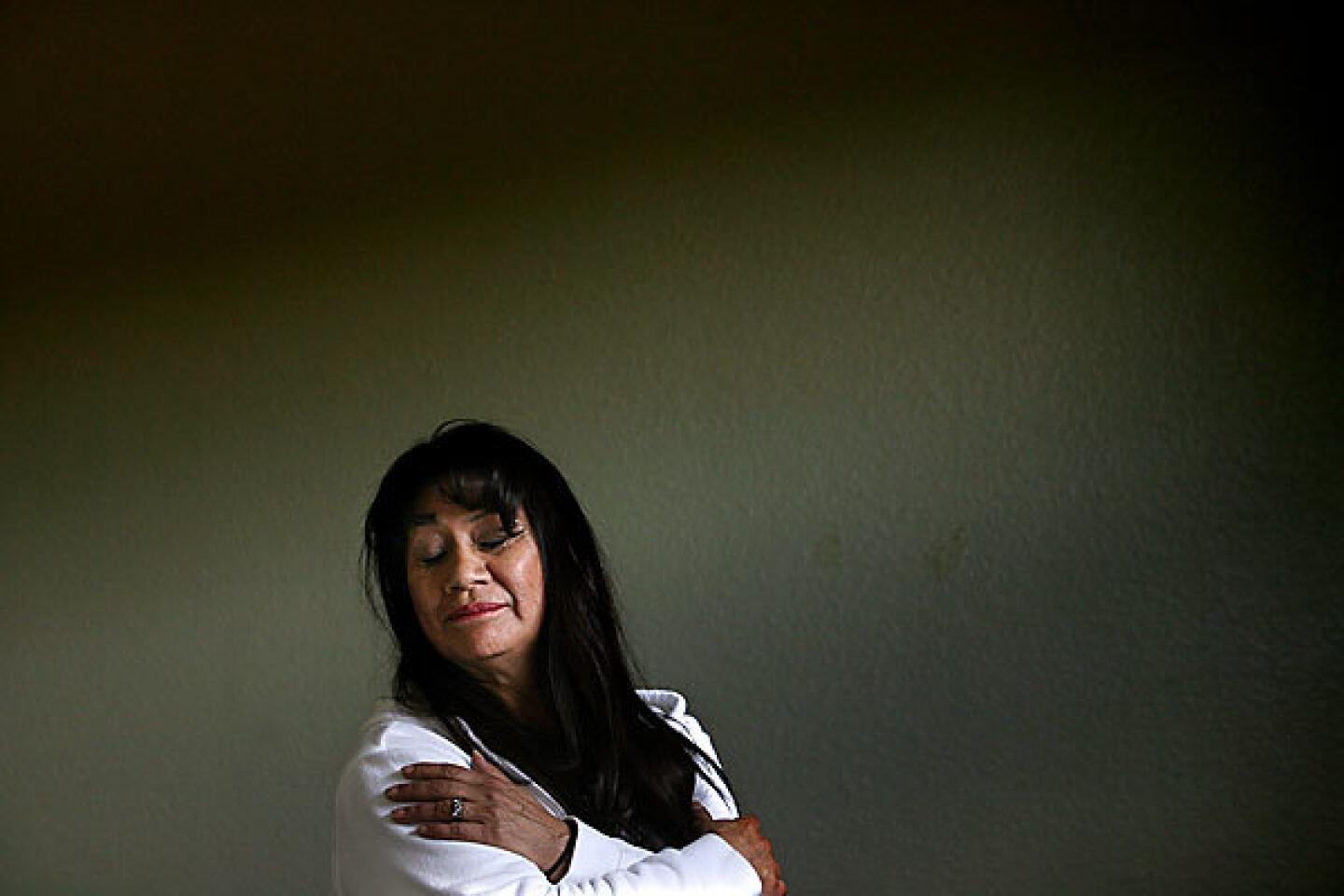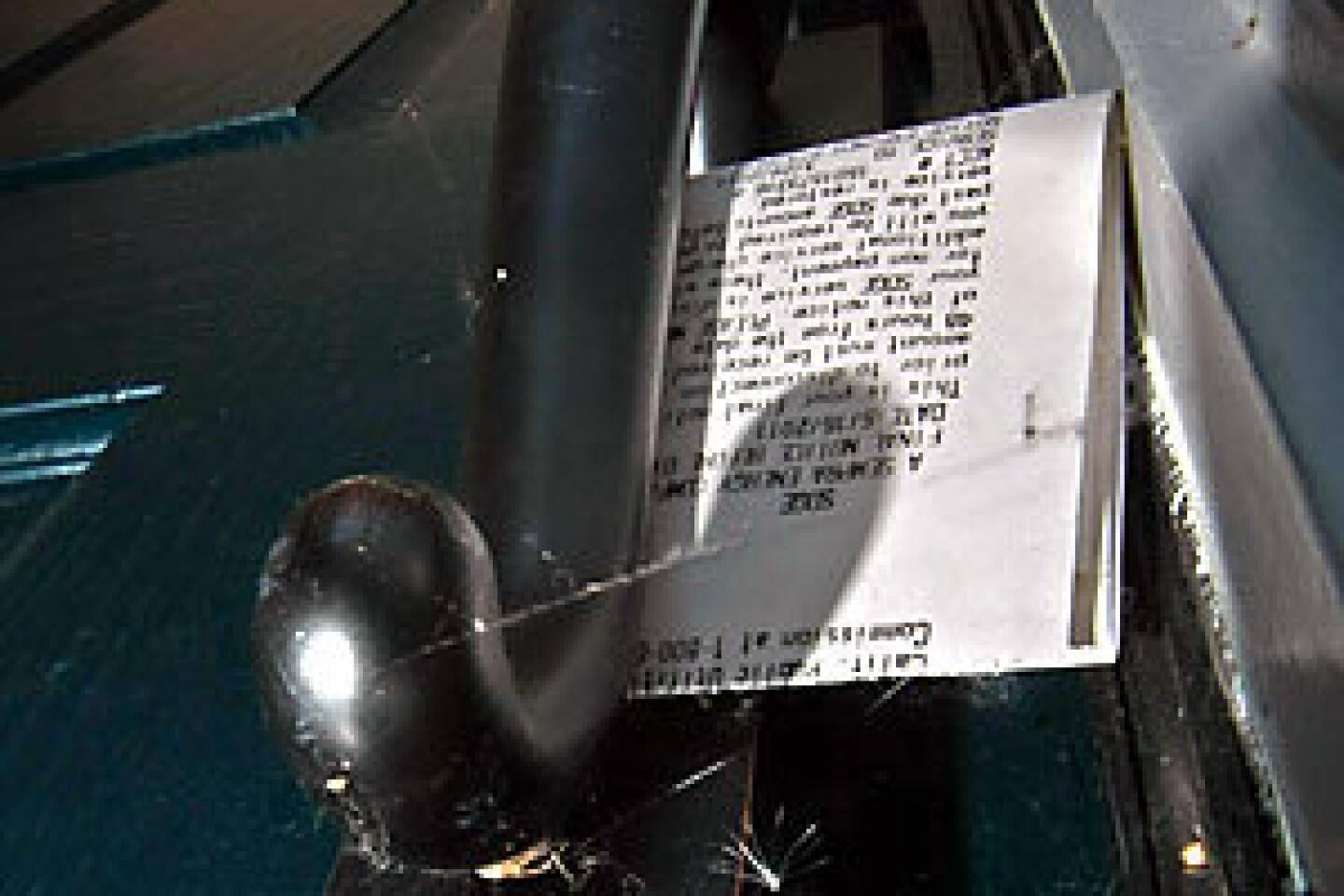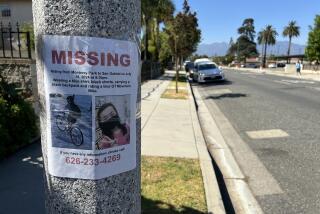Where did the McStays go?
Reporting from Fallbrook, Calif. — Joseph and Summer McStay’s home sat on a quiet cul-de-sac, beneath a mountain thick with avocado trees. The fenced backyard was perfect for Bear, Summer’s Akita, and there was plenty of room upstairs for their two toddlers.
Soon after they moved in, in late 2009, Summer had launched a big renovation — paint, tile flooring and granite countertops. She also adopted a puppy.
Six weeks later, on a chilly Thursday evening in February, the family piled into their Isuzu Trooper and drove away. Then they vanished.
Photos: A Fallbrook family vanishes
When Det. Troy Dugal walked into their living room 11 days later, he saw two bowls of popcorn sitting on futons in front of the TV. A half-empty popcorn bag was beneath the microwave. On the counter was a carton of eggs and a banana, which had gone bad.
“It looked like somebody left in a hurry,” he recalled. “Not frantically, but in a hurry.”
There were no signs of a struggle or forced entry. They couldn’t have intended to be gone long.
It is exceedingly rare for a family of four to disappear in America.
Most missing-persons cases involve children. When adults go missing, they get less attention from police departments — absent signs of dementia or foul play. It’s not illegal, after all, for adults to take themselves and their children away without telling anyone.
About 1 million people are reported missing every year in the United States, and 95% of those cases are resolved in the first 24 hours. The likelihood of being found shrinks with every day, every week, every month that passes.
The McStay mystery began with a call to the San Diego County Sheriff’s Department on Feb. 10, 2010, six days after the family’s last contact with friends and relatives.
It was from Dan Kavanaugh, who ran the website for Joseph’s business, Earth Inspired Products, which installs water fountains. He hadn’t been able to reach Joseph for several days. The McStays occasionally had gone away for a weekend without telling anyone, but it was unusual for him to be out of touch for this long.
Four days later Joseph’s brother, Mike McStay, also called the sheriff’s office. By then, Joseph’s family had been unable to reach him for 10 days. The next morning, sheriff’s detectives met Mike at the Fallbrook house. Dugal, 50, a homicide detective and the son of a career policeman, was the lead investigator.
They found paintbrushes and cans in the living room. Most of the furniture, Mike told him, was in storage, and the family appeared to be living out of suitcases.
Dugal didn’t see any obvious sign of a struggle.
He went door to door in the neighborhood. No one had seen the McStays in more than a week. Neighbors said they’d grown worried about the dogs and started feeding them.
He interviewed friends and family, all of whom had the same story: “The bottom line,” he concluded, “was that life was normal for the McStays up to Feb. 4, and on that day they just vanished.”
Dugal ran a check on the family’s vehicles. Their green truck was parked in the driveway, but their Isuzu Trooper was missing. Investigators examined a surveillance recording from a neighbor’s security camera. It showed an Isuzu Trooper driving away from the McStays’ house at 7:47 p.m. on Feb. 4.
Within hours, Dugal found the Trooper. The SUV had been towed on Feb. 8, four days after the family disappeared, from the parking lot of a strip mall in San Ysidro, an hour’s drive from the McStay home and a short walk from a pedestrian crossing into Mexico.
Dugal spoke with the two security guards who had been on duty that night. They had first noticed the vehicle in the lot shortly after dark and, because the hood was cold, concluded that it had arrived around 5 p.m. When it was still there at 11 p.m., they called a tow truck.
The SUV yielded few clues. It was found locked, and fingerprints found on it matched the McStays’. Two child-restraint seats were in the back and some new toys, most still in their packaging, were in the rear storage area. Family members said one of the boys had a birthday a week before the disappearance.
Had the McStays parked and walked into Tijuana? Dugal thought it was a possibility.
He got surveillance footage from the border crossing. Volunteers from the National Center for Missing & Exploited Children helped him study hours of video, looking for the family among the 100,000 people who walked across the border that Monday. They all agreed that one particular clip, with a time stamp of 7 p.m., was worth closer examination.
It was a rear view of a man holding the hand of a young boy in a beanie cap. Walking behind them was a woman holding the hand of a smaller boy, also in a beanie cap. All four were walking toward the border gate.
The woman had a small handbag draped over her shoulder, and the man carried what appeared to be a small plastic grocery sack in his free hand.
Relatives looked at the video clip, but no one was certain that it was the family. The woman wore a white jacket with a fur lining similar to one Summer owned. Summer also often wore Uggs, just like the woman in the video. But Joseph’s mother and brother thought the man seemed too tall and slim.
Over the next few weeks, Dugal had the computers in the house analyzed by the FBI forensic lab and came up with a piece of circumstantial evidence.
A week before the family disappeared, someone used the desktop computer to research travel to Mexico. One search specifically asked: “What documents do children need for traveling to Mexico?”
“The family didn’t want to believe it. I didn’t want to believe it,” Dugal said. “But the truth is, it was evidence. A possibility had changed into a probability.”
But Dugal knew there were several problems with that theory.
For one thing, as the answers to the computer search questions made clear, adults need a passport to enter Mexico and re-enter the United States. Joseph had a passport; Summer did not. (The children needed birth certificates, and though one boy’s birth certificate was found in the home, the parents could have made copies.)
And, even if the family did enter Mexico, where had they been the previous four days?
Dugal thought it likely that the family had spent those four days in Southern California. But what were they doing? Why didn’t they answer their cellphones?
Dugal began to scour the family’s records. The last call Joseph made on his phone was shortly after the Trooper left the neighborhood on Feb. 4. He called one of his employees, who said they talked business.
The detective checked their bank accounts. The McStays had $20,000 in savings in a joint account and Summer had $20,000 in another. There’d been no unusual withdrawals or deposits.
The activity in Joseph’s business account, which had a balance of about $65,000, seemed consistent with business operations. Some withdrawals were made after his disappearance, but Dugal determined those were transactions conducted by Joseph’s employees.
“The bottom line is that life is normal until that day,” Dugal said. “And after that day, neither Summer nor Joseph existed on paper.”
By this point in a missing-persons investigation, detectives would expect to have some solid evidence of what happened. But this “was one of those head-scratchers,” Dugal said. “The totality of it didn’t make sense.”
For one thing, the McStays seemed very settled.
Joseph, 40, spoke several times a week with his brother in San Clemente as well as his mother in Corona and his father in Houston. More significant, perhaps, Joseph was close to a 14-year-old son from his first marriage who also lived in northern San Diego County.
Summer, 43, was a stay-at-home mom whom friends described as fiercely protective of her boys, Gianni, 4, and Joseph Jr., 3. She also was in regular contact with her family, including a sister, Tracy Russell, in Big Bear.
On the morning of Feb. 4, Summer had talked with her sister, who had recently had a baby, and promised to bring her boys up for a visit soon. That afternoon, Summer used a credit card to buy baby clothes.
Russell said Summer had been preoccupied that week with her home renovation. The couple had put $30,000 down to buy the $300,000 home, and she’d just spent $4,000 on new flooring.
Summer had enlisted one of the couple’s friends, McGyver McCargar, to help her paint. As McCargar left the house on Wednesday, Feb. 3, he and Summer agreed that he’d return Saturday. When he texted Summer that night to confirm, she replied: “Yes, we’ll see you Saturday.” He still has the text on his phone.
On Friday night, Feb. 5, McCargar sent several texts to Summer asking whether she still needed him on Saturday. When she didn’t reply, he assumed she had gotten someone else to finish the job.
Dugal thinks it’s most likely that the family left their home voluntarily on Feb. 4 and intended to return. But he doesn’t think the McStays would break off contact with family members for 15 months. He now suspects foul play.
The mystery weighs especially heavily on Joseph’s and Summer’s families.
Joseph’s father, Patrick, has been sharply critical of the investigation, contending that it hasn’t been aggressive enough.
Joseph had given his father the passwords for both his and Summer’s email accounts, and last fall Patrick went through thousands of their messages in a search for clues. He learned that a few months before they disappeared, Summer had ordered a Spanish-language program. Was it to prepare the family to go to Mexico?
Patrick doesn’t believe so.
“Why would my son, as smart as he was, take his family to a place that is so wildly dangerous right now?” he said.
Joseph’s brother Mike maintains a website with photos and home videos of the family, and tips arrive in waves every time television programs featuring the case are rebroadcast. Last week, Dugal investigated a sighting in Indiana; a few weeks earlier it was Burbank. None panned out.
Last year, a waiter at a restaurant in Baja said he had served the family, whom he recognized from posters put up in the region. But the FBI investigated and could find no corroboration.
Family members can only speculate. Did someone force the family to go to Mexico? Did someone hurt Joseph and then abduct Summer and the kids? Were both parents attacked and the kids abducted?
Weeds grow knee-high in the frontyard of the McStays’ home on Avocado Vista Lane.
On the welcome mat by the front door recently was a letter: a foreclosure specialist offering his services. When the bank learned the couple were missing, it froze their accounts, pushing the house into foreclosure. It’s due to be auctioned off next month.
Photos: A Fallbrook family vanishes
More to Read
Sign up for Essential California
The most important California stories and recommendations in your inbox every morning.
You may occasionally receive promotional content from the Los Angeles Times.














